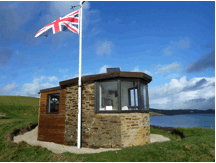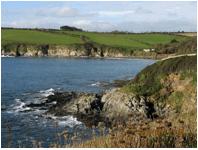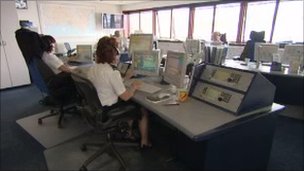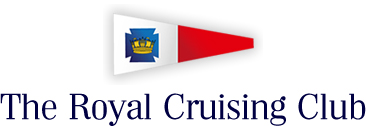Original Notes Made at the Time
 Last month I spent some time writing about flags and their uses. That reminded me that occasionally people visiting the Lookout question the fact that we only fly a Union Jack and not a Cornish flag. Well the reason is, of course, that we are a National Organisation and not a local county one, so the union flag is the correct one to fly. If we had two masts as some stations do then we could fly one flag on each but we only have one.
Last month I spent some time writing about flags and their uses. That reminded me that occasionally people visiting the Lookout question the fact that we only fly a Union Jack and not a Cornish flag. Well the reason is, of course, that we are a National Organisation and not a local county one, so the union flag is the correct one to fly. If we had two masts as some stations do then we could fly one flag on each but we only have one.
It would be improper to fly two flags on one mast as one would have to be ‘inferior’ to the other and this is not something with which we would wish to get involved. It has always been customary for a vessel taken as a prize in wartime to fly its national flag above that of the captured vessel. You can imagine the minefield to which that would lead us!
Our Lookout is not big, in fact probably one of the smallest in the country. It is one of the original pattern of Coastguard Lookouts of which hundreds were built in the days when the Coastguard actually kept a lookout at vantage points such as ours. Many of those in Cornwall that I know of have plenty of space to accommodate two Watch keepers and have sufficient volunteers to double man – very useful if something happens that needs us to take action.
 Not only does our Watchkeeper have to keep the casualty in view, plot his position, tell the Coastguard, possibly direct the Lifeboat but he or she also has to maintain a Log of events. If you are a Watchkeeper on your own it can all get a bit traumatic and sometimes notes made at the time get scribbled into the Log rather than neatly written. That phrase ‘notes written at the time’ is the key. Should the event get serious, certainly with a fatality, then there would be an inquest and probably a Marine Accident Investigation Enquiry.
Not only does our Watchkeeper have to keep the casualty in view, plot his position, tell the Coastguard, possibly direct the Lifeboat but he or she also has to maintain a Log of events. If you are a Watchkeeper on your own it can all get a bit traumatic and sometimes notes made at the time get scribbled into the Log rather than neatly written. That phrase ‘notes written at the time’ is the key. Should the event get serious, certainly with a fatality, then there would be an inquest and probably a Marine Accident Investigation Enquiry.
The record in the Log Book might well have to be produced in Court as evidence as to what happened. One of the first things you learn as a Police Officer is that there is no substitute for ‘original notes made at the time’. It does not matter what they are written on – back of an envelope, paper tissue, anything you like – but the fact that they were written down at the time allows them to be used in evidence. Of course in our Lookout a proper book is provided and we are expected to use it but, if the pressure is really on, then no one is going to question the fact that you have suddenly picked up a red pen by mistake or have scribbled something not in the right place.
 As I have said our Lookout is a bit cramped for two people but we manage whenever someone is down there as a Trainee. Although we have ‘classroom’ training sessions run in Portscatho Memorial Hall by our training staff there is no substitute for on site training carried out doing a watch for real in the Lookout. Our system is such that, while you have a Mentor who keeps an eye on your overall progress, you are encouraged to go on watch at a time to suit you and pair up with a qualified Watchkeeper for that particular shift. That way you meet many of the rest of the team and can see how different people do the same job in different ways.
As I have said our Lookout is a bit cramped for two people but we manage whenever someone is down there as a Trainee. Although we have ‘classroom’ training sessions run in Portscatho Memorial Hall by our training staff there is no substitute for on site training carried out doing a watch for real in the Lookout. Our system is such that, while you have a Mentor who keeps an eye on your overall progress, you are encouraged to go on watch at a time to suit you and pair up with a qualified Watchkeeper for that particular shift. That way you meet many of the rest of the team and can see how different people do the same job in different ways.
You can ask as many questions as you want, play with the equipment, draw pretty pictures on the chart, write in the log and, in fact, actually do the watch. I think most qualified Watchkeepers do as I do – you have a slave down there so let them do the work. A facetious comment – but if the Trainee actually does the job while you are there to show what should be done and to check it is correct afterwards, then that person will learn and gain confidence. It’s not rocket science – it’s a simple procedure which you follow using the training you have been given. Just in passing – we still need more volunteers. If you want to find out more ring Bob on 01872 -580720 or Robert on 501670.
 As I said earlier, space is at a premium in the Lookout. We now have an extra radio which is dedicated to Channel 65, the new National Coastwatch Radio Channel. Then we have the everyday Marine Band radio on which we listen on Channel 16 for emergency calls, weather reports etc. There is a new weather station giving up to the minute data on what is actually happening outside and, when you then add telephone, binoculars, telescope, hand held recorder, chart table with its necessary bits and pieces, you can begin to see that we are pushed for space.
As I said earlier, space is at a premium in the Lookout. We now have an extra radio which is dedicated to Channel 65, the new National Coastwatch Radio Channel. Then we have the everyday Marine Band radio on which we listen on Channel 16 for emergency calls, weather reports etc. There is a new weather station giving up to the minute data on what is actually happening outside and, when you then add telephone, binoculars, telescope, hand held recorder, chart table with its necessary bits and pieces, you can begin to see that we are pushed for space.
The problems are further complicated by the fact that we have no mains electricity which means we have to have two large batteries charged by solar panels on the roof. But we have it sorted. It is compact and efficient, everything to hand, and we are a properly certificated station, holding Declared Facility Status, – a technical term to say we have passed the exam and can do the job.
 It remains to be seen what the effect of the closure of Brixham Coastguard Station will have on the emergency cover in the area. The MRCC at Falmouth has been retained but they or some other station are going to have to shoulder the considerable day to day work which had been handled by Brixham. To us locally in our Lookout it always seemed that Brixham was a very busy station dealing with a large amount of inshore and recreational traffic while Falmouth, in reality carrying a far heavier load, was not heard so much on Channel 16 as its work is worldwide, much being carried by satellite.
It remains to be seen what the effect of the closure of Brixham Coastguard Station will have on the emergency cover in the area. The MRCC at Falmouth has been retained but they or some other station are going to have to shoulder the considerable day to day work which had been handled by Brixham. To us locally in our Lookout it always seemed that Brixham was a very busy station dealing with a large amount of inshore and recreational traffic while Falmouth, in reality carrying a far heavier load, was not heard so much on Channel 16 as its work is worldwide, much being carried by satellite.
Also, of course, it deals with commercial shipping of which Brixham had very little. Time will tell but efforts appear to be being made to remove extraneous work from Falmouth – we now don’t, for example, log on and off with them each day as we used to. Common sense, really, as they know the hours that our Station is manned each day of the week and that should be enough. Maybe people are beginning to realise that N.C.I. can be a useful organisation, partially filling the gap caused by the closing of the Coastguard Lookouts way back in the 1990’s.
 We are now the only people who are actually watching what goes on inshore and on the beaches and cliffs. Human bodies and very small boats don’t show up on radar – there is no substitute for the man or woman with a pair of binoculars and a telephone. The R.N.L.I have for a long time recognised our usefulness in being eyes that can see what they cannot. Now the Royal Cruising Club has recognised our efforts on behalf of the leisure sailor and awarded us their medal for services to cruising in 2014.
We are now the only people who are actually watching what goes on inshore and on the beaches and cliffs. Human bodies and very small boats don’t show up on radar – there is no substitute for the man or woman with a pair of binoculars and a telephone. The R.N.L.I have for a long time recognised our usefulness in being eyes that can see what they cannot. Now the Royal Cruising Club has recognised our efforts on behalf of the leisure sailor and awarded us their medal for services to cruising in 2014.
Some Harbour Patrols realise that we can be helpful – last year in Gosport our new Channel 65 was used by the Patrol to ask the N.C.I Watchkeeper to identify a yacht in trouble. But it’s not only safety, perhaps. This country has an immense coastline with innumerable nooks and crannies. Drugs and people are landed illegally and the only people keeping a regular watch are the N.C.I. We already have occasional contact with the Border Agency in the same way that anyone on the Coast can ring them with information. I wonder what will be considered our duties in another five years.

